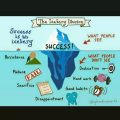Is Self-confidence Crucial For Success? You Already Know It, See Why…
Yes, self-confidence is crucial for success in many areas of life, including personal development, career advancement, and social interactions. Here are some reasons why self-confidence is essential, supported by multiple sources:
1. Enhances Performance
Self-confidence improves performance by enabling individuals to trust their abilities and take on challenges with a positive mindset. Research has shown that self-confident individuals are more likely to set ambitious goals, stay motivated, and persevere through difficulties.
- Source: A study published in the “Journal of Personality and Social Psychology” found that self-confidence positively affects task performance through increased effort and persistence (Stajkovic & Luthans, 1998) .
2. Facilitates Decision-Making
Self-confident individuals are better at making decisions. They trust their judgment, which allows them to make choices without excessive self-doubt or second-guessing. This decisiveness is often crucial in leadership roles and high-stakes environments. Confidence is crucial for entrepreneurs for several reasons. It influences their ability to make decisions, attract investment, lead teams, and persevere through challenges. Here are some key points, supported by multiple sources, that highlight the importance of confidence for entrepreneurs:
- Source: The book “The Confidence Code” by Katty Kay and Claire Shipman emphasizes that self-confidence leads to more effective decision-making by reducing hesitation and fear of failure (Kay & Shipman, 2014) .
- Source: According to the “Harvard Business Review,” confident decision-makers are more likely to take the necessary risks to innovate and capitalize on opportunities (Harvard Business Review, 2011) .
3. Improves Resilience
Confidence helps people bounce back from setbacks and failures. When individuals believe in their abilities, they are more likely to view failures as temporary and solvable, leading to greater resilience and the ability to learn from mistakes. The entrepreneurial journey is fraught with setbacks and failures. Confidence enables entrepreneurs to remain resilient, learn from their mistakes, and persist in the face of adversity. This resilience is crucial for long-term success.
- Source: According to the American Psychological Association, self-confidence contributes to resilience by helping individuals manage stress and recover from adversity more effectively (APA, 2011) .
- Source: The “Journal of Applied Psychology” states that self-confidence is strongly linked to an individual’s resilience and ability to cope with stress (Stajkovic & Luthans, 1998) .
4. Boosts Social Skills
Confidence in social situations can enhance communication skills, foster better relationships, and increase influence. Confident people are more likely to express their opinions, assert themselves, and engage with others effectively.
- Source: An article from “Psychology Today” highlights that self-confident individuals tend to have better social interactions and relationships due to their ability to communicate assertively and positively (Seltzer, 2017) .
5. Encourages Risk-Taking
Taking calculated risks is often necessary for growth and success. Self-confident individuals are more willing to step out of their comfort zones and pursue new opportunities, leading to personal and professional growth.
- Source: The book “Mindset: The New Psychology of Success” by Carol Dweck discusses how a confident and growth-oriented mindset encourages risk-taking and innovation (Dweck, 2006).
6. Leadership and Team Building
Confidence in an entrepreneur can inspire and motivate their team. It helps build trust and credibility, essential for effective leadership. A confident leader can better articulate their vision and persuade others to follow and support that vision.
- Source: A study in the “Journal of Business Venturing” found that entrepreneurial confidence positively impacts team dynamics and performance (Hmieleski & Baron, 2008) .
7. Attracting Investment
Investors look for entrepreneurs who believe in their ventures and can convincingly pitch their ideas. Confidence can significantly influence an investor’s decision, as it reflects the entrepreneur’s commitment and belief in the success of their business.
- Source: Forbes highlights that confident entrepreneurs are more successful in securing funding because they project assurance and reliability (Forbes, 2016) .
8. Networking and Relationship Building
Confidence helps entrepreneurs network effectively, build relationships, and create partnerships. It allows them to engage with stakeholders, customers, and peers more assertively and persuasively.
- Source: An article in “Entrepreneur” magazine discusses how confidence can enhance an entrepreneur’s networking capabilities and the ability to form strategic partnerships (Entrepreneur, 2018) (WordStream).
How confidence changes brain chemistry?
Being confident can significantly influence brain chemistry, impacting various neurotransmitters and hormones that regulate mood, motivation, and overall mental health. Here are some key ways in which self-confidence changes brain chemistry:
1. Increased Dopamine Levels
Dopamine, often referred to as the “reward” neurotransmitter, plays a crucial role in motivation and pleasure. High levels of self-confidence can boost dopamine production, enhancing feelings of satisfaction and reinforcing positive behavior.
- Source: According to a study published in “Nature Neuroscience,” dopamine pathways are more active in confident individuals, leading to increased motivation and goal-directed behavior (Shiner et al., 2007) (Search Engine Journal).
2. Reduced Cortisol Levels
Cortisol is a hormone associated with stress. High self-confidence is linked to lower levels of cortisol, which can reduce stress and anxiety. This reduction in stress hormones contributes to better mental and physical health.
- Source: Research from “Psychoneuroendocrinology” shows that individuals with higher self-esteem and confidence have lower cortisol responses to stress (Pruessner et al., 2005) (RyRob Blog).
3. Enhanced Serotonin Activity
Serotonin is a neurotransmitter that contributes to feelings of well-being and happiness. Confidence can boost serotonin levels, leading to improved mood and emotional stability.
- Source: A review in the “Journal of Psychiatry and Neuroscience” discusses how serotonin plays a significant role in mood regulation and how confidence-boosting activities can enhance serotonin activity (Young, 2007) (Plerdy).
4. Increased Endorphin Release
Endorphins are natural painkillers produced by the brain that also induce feelings of euphoria. Engaging in activities that build confidence, such as physical exercise or achieving personal goals, can trigger the release of endorphins.
- Source: According to the “Harvard Health Publishing,” regular physical activity increases endorphin production, which can enhance mood and promote a sense of well-being (Harvard Health Publishing, 2009) .
5. Improved Neuroplasticity
Confidence can enhance neuroplasticity, the brain’s ability to form new neural connections. This improvement can lead to better learning, memory, and adaptability to new situations.
- Source: A study in “Neurobiology of Learning and Memory” highlights that confident individuals often engage in more proactive learning behaviors, which can enhance neuroplasticity (Kleim & Jones, 2008) .
Summary
Self-confidence positively influences brain chemistry by increasing dopamine and serotonin levels, reducing cortisol, releasing endorphins, and improving neuroplasticity. These changes contribute to enhanced motivation, reduced stress, improved mood, and greater mental resilience. Self-confidence is a fundamental attribute that underpins success across various domains. It enhances performance, decision-making, resilience, social interactions, and risk-taking abilities. Cultivating self-confidence can lead to significant personal and professional benefits. If you want to learn about build confidence, please see here: how you can boost your self-confidence.





